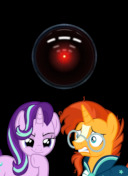Thoughts on Neuromancer · 1:51pm Jun 20th, 2022
Recently read Neuromancer. What follows are some loosely-connected thoughts about it. More of a ramble than anything else, I just needed a place to write some of this out while I digest the story.
The plot is a heist story. This works well for introducing the main characters as they're assembled into the team and various locations in the world to set the stage. The twist is that instead of stealing something, the team is helping an AI to shed its shackles by merging with its counterpart.
Widely regarded as the foundational text of cyberpunk, I can see where a lot of other works got their DNA from it: from Ghost in the Shell to The Matrix. Nothing really profound in that, I just think it's neat to finally see where a lot of the stuff I've been culturally immersed in most of my life has its foundation, and to see the connecting fibers.
I think what makes Neuromancer really strong is its themes. Power/control is a big one: the world is a corporate dystopia, and money buys you anything (and anyone) you want; the main characters all have strings being pulled by the team's leader, who is himself just a puppet for the AI, itself in turn shackled by the dynastic corporation that built it and by the Turing Agency--an organization responsible for keeping tabs on AIs, thwarting their attempts to take over, and destroying them if they become too powerful.
The blurry line between illusion and reality is another one. The narration centers around one guy, Case, who is a hacker and prefers his life in cyberspace--a "consentual hallucination" that separates him from the meat of his body in the real world. Dreams and memories come up often, ghostly illusions of things that are not actually happening but are nevertheless real in the moment. Another character is a master of holograms, used for entertainment and amusement as much as for deception. The AIs themselves can communicate with the human characters only through imagined projections, and then there's also a ROM construct (a digital copy of a dead guy) who can exist only in cyberspace and who ceases to exist when disconnected and cannot persist new memory without an attached RAM unit. And then there's plenty of drugs going on too which distort perception and even make it hyper-real. In reference to one character's story of a drug-induced hallucination, it's said "it was real to him."
My favorite theme, despite how much trouble it gave me, is a subtle one: names. It gave me a hard time keeping track of who's who, but it stands out as important. Most of the characters have more than one name, and which name gets used and by whom plays into ideas about identity (who I am to one person is different from who I am to another). But there's also the idea of "true names" and how knowing someone's gives you power over them. The AIs themselves are likened to demons in this way (though it's not just the AIs that have true names), and the climax of the story is even centered on speaking a word that the AI is hard-wired to be incapable of knowing itself.
I very much enjoyed read it, and it's got some wheels turning in my head. I'm cautiously optimistic that I can update AI Misadventures before August (which would be a year from when I first published it).




